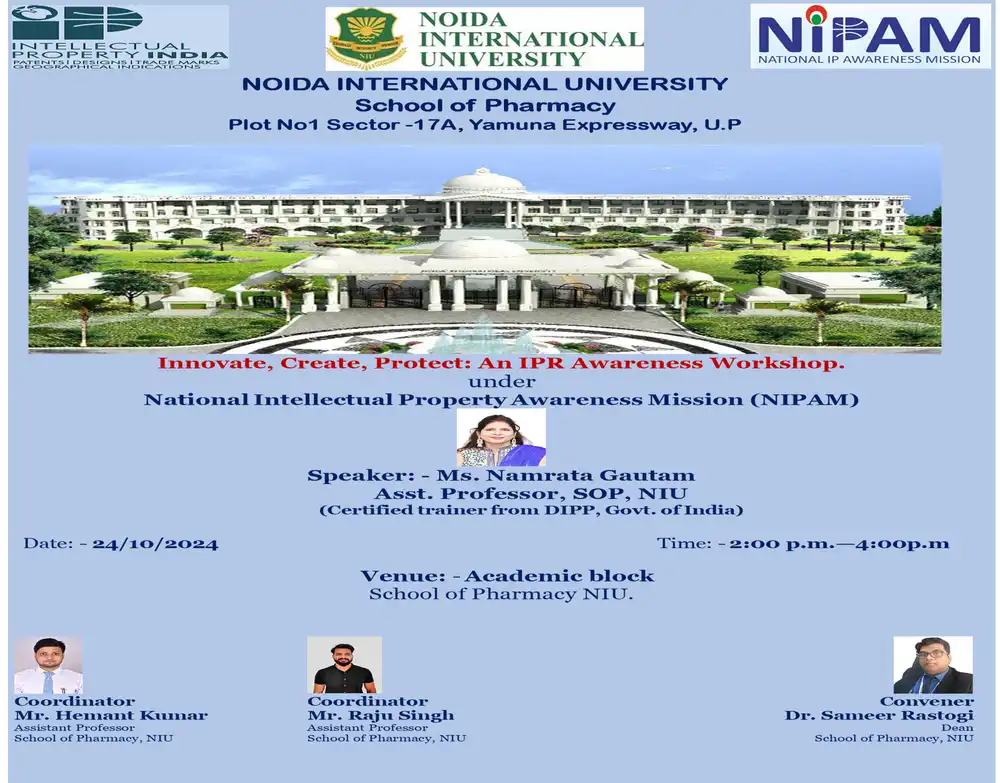WORKSHOPREPORT
ON
Intellectual Property Rights , National Intellectual Property Awareness Mission (NIPAM)
Noida International University Department of Pharmacy Collaboration with Indian Patent Office, Delhi
Name of the Event: WORKSHOP
Organized By: School of Pharmacy, Noida International University
DATE OF VISIT: 24/10/2024, October
On October 24, the School of Pharmacy at Noida International University (NIU) hosted a pivotal workshop on Intellectual Property Rights (IPR), under the National Intellectual Property Awareness Mission (NIPAM) Titled “Innovate, Create, Protect”, the workshop aimed at enhancing the understanding of intellectual property among students, researchers, and faculty members, and provided valuable insights into the importance of safeguarding innovations and creative outputs.
The event was graced by Ms. Namrata Gautam, an Assistant Professor at NIU’s School of Pharmacy, who was the keynote speaker. Ms. Gautam, a certified trainer in IPR from the Department for Promotion of Industry and Internal Trade (DIPP), Government of India, brought her extensive expertise to the session. Her presentation covered key aspects of intellectual property rights, with a particular focus on how individuals and organizations can utilize the existing frameworks to protect their innovations, inventions, and creative works.
Key Topics Discussed:
1. Introduction to Intellectual Property Rights (IPR)
Ms. Gautam began by explaining the fundamental concept of IPR and its relevance in today’s knowledge-driven economy. She highlighted that intellectual property refers to creations of the mind, such as inventions, literary and artistic works, designs, symbols, names, and images used in commerce. By protecting these creations, IPR encourages innovation and creativity, which in turn fosters economic growth and societal progress.
2. Types of Intellectual Property
The session covered the major types of intellectual property protection, including:
– Patents: Protection of inventions and technical innovations. Ms. Gautam explained the process of filing patents in India and the criteria for patentability, such as novelty, inventive step, and industrial applicability.
– Trademarks: Protection of brand names, logos, and other identifiers that distinguish goods and services in the marketplace. The significance of trademarks in building brand identity and customer trust was underscored.
– Copyrights: Protection of literary, artistic, and musical works, ensuring that creators retain control over the use and distribution of their works.
– Geographical Indications (GIs): A lesser-known but crucial aspect of IPR, GIs protect products that have specific geographical origins and possess qualities or reputations linked to that location (e.g., Darjeeling tea, Basmati rice).
3. The Role of IPR in Innovation and Research
Ms. Gautam emphasized the importance of IPR in research and development, particularly in fields like pharmaceuticals, biotechnology, and information technology. For students and researchers at NIU, this aspect was particularly relevant, as it highlighted how innovations in drug formulation and health care products could be protected through patents, leading to potential commercialization.
4. Filing and Managing IPR
The session delved into the procedural aspects of filing for intellectual property protection. Ms. Gautam walked participants through the process of patent filing, trademark registration, and copyright application in India. She also discussed the global implications of IPR and how creators can seek protection internationally through mechanisms such as the Patent Cooperation Treaty (PCT) and the Madrid System for trademarks.
5. Challenges in IPR Enforcement
One of the key takeaways was the discussion on the challenges surrounding the enforcement of intellectual property rights. Counterfeiting, piracy, and patent infringements remain major obstacles for innovators and creators. Ms. Gautam stressed the importance of having robust legal frameworks and enforcement mechanisms to address these issues, ensuring that innovators are incentivized to continue creating.
6. IPR and Entrepreneurship
For students aspiring to become entrepreneurs, the workshop shed light on how intellectual property can be a valuable business asset. Patents, trademarks, and copyrights can add significant value to startups by providing competitive advantages and potential revenue streams through licensing agreements or sale of IP.
Workshop Impact and Conclusion:
The IPR workshop was highly interactive, with students and faculty members engaging in discussions and raising pertinent questions.
The coordinators and faculty members, Mr.Hemant Kumar and Mr. Raju Singh, both Assistant Professors at NIU’s School of Pharmacy, ensured the smooth execution of the event.
The session was convened by Dr.Sameer Rastogi , Dean of the School of Pharmacy, who lauded the efforts of the organizers and highlighted the growing importance of intellectual property in academic and research institutions.
This workshop is part of NIU’s broader initiative to promote innovation and research, in line with the National Intellectual Property Awareness Mission (NIPAM). By empowering students and researchers with knowledge about IPR, the university aims to foster a culture of innovation, creativity, and entrepreneurship, ensuring that ideas and innovations are properly protected and can contribute to national and global progress.
The event concluded with a call to action for participants to actively explore the realm of intellectual property, protect their ideas, and contribute to India’s innovation ecosystem.


